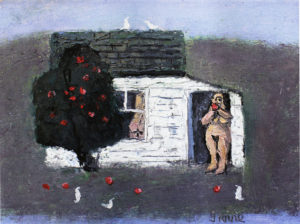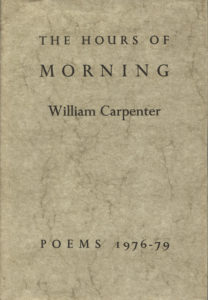First Couple
by William Carpenter

Real nudists love apples and we always have.
Someone said maybe we shouldn’t eat them, but what the hell,
we’d just been created and we were starved.
It was either the apples or the herring gulls.
No one would know. No one else even existed,
just this one little garter snake on an innocent rock.
I said, Bill, we’re being stupid. He’s not even around,
you’re tallest, reach up and pick me one. We ate the apple.
We ate the core and swallowed the seeds of time.
Then honest to God, the sky darkened and the sun went out.
It started snowing and a plow drove past
that said Maine Department of Transportation.
Fifteen below zero and there we stood, not even underwear.
I gave him an ultimatum. I said, Bill, build us a little house
with a wood stove or I’m leaving for Mexico
What’s more, you and those seagulls have eaten half the apples.
You’ve had your limit. Butt out. This one belongs to me.
Come My Friend, ‘Tis Not Too Late To Seek A Newer World
by William Carpenter

We wanted him back but when he came we knew
the man we had been wanting was someone else.
Naturally, the dogs snapped at his legs. How
could he expect them to have remembered?
Not one of them was alive when he started out.
We’ve made some adjustments here, you know how it is.
The kids don’t want any more heroes. They’ve got a kind
of music that keeps them going and they don’t look back.
Without the figurehead, too, his little yacht is a joke.
Our talent was for waiting. That we were good at.
We feasted on hekatombs. We wove the tapestries
of absence, took them apart, reworked them until
weaving and unweaving became our life.
He talks all night. He has a dialect
we haven’t spoken for twenty years. He smells
of women. He asks an asks for what we no longer have.
We used to watch all day for a ship on the horizon.
Now that he’s finally here, the sea is empty.

“He bursts through the thin tissue of reality time after time, leapfrogging over the most commonplace objects and situations to bring out solutions—or dissolutions—that satisfy our ardor to correct and codify human chaos.”
—Maxine Kumin

“These are poems that confirm us in our human frailty, our questing appetites, our need always to search out the germ of order in the chaos of emotion.”
—Maxine Kumin

“Who could possibly imagine that Robert Shetterly’s incisive drawings could be illuminated by even one word beyond his own? Or that any poem by William Carpenter could be made more lucid by any pen-and-ink lines beyond those which he himself wrote? … Each having survived his separate odyssey, they here bring home a composite mythifying that should revive almost anybody’s memory, sense, and spirit.”
—Phillip Booth
Rain
by William Carpenter
A man stood in the rain outside his house.
Pretty soon, the rain soaked through
his jacket and shirt. He might have
gone in, but he wanted to be wet, to be
really wet, so that it finally got through
his skin and began raining on the rooftops
of the small city that the man always carried
inside him, a city where it hadn’t rained
for thirty years, only now the sky darkened
and tremendous drops fell in the thick dust
of the streets. The man’s wife knocked
on the window, trying to call him in.
She twirled one finger around her ear
to sign that he was crazy, that he’d
get sick again, standing in street clothes
in a downpour. She put the finger in her mouth
like a thermometer. She formed the word idiot
with her lips, and, always, when she said that
he would give in. But now he stood there.
His whole life he’d wanted to give something,
to sacrifice. At times he’d felt like coming up
to people on the street, offering his blood.
Here, you look like you need blood. Take mine.
Now he could feel the people of his city
waking as if from a long drought. He could feel
them leaving their houses and jobs, standing
with their heads up and their mouths open,
and the little kids taking their clothes off
and lying on their bellies in the streams
and puddles formed by the new rain that the man
made himself, not by doing anything, but standing
there while the rain soaked through his clothes.
He could see his wife and his own kids
staring from the window, the younger kid
laughing at his crazy father, the older one
sad, almost in tears, and the dog, Ossian–
but the man wanted to drown in the city in rain.
He wanted the small crowded apartments
and the sleazy taverns to empty their people
into the streets. He wanted a single man with
an umbrella to break out dancing the same way
Gene Kelly danced in Singing in the Rain,
then another man, and more, until the whole
city was doing turns and pirouettes with their
canes or umbrellas, first alone, then taking
each other by the arm and waist, forming a larger
and larger circle in the square, and not
to any music but to the percussion of the rain
on the roof of his own house. And if there were
a woman among the dancers, a woman in a flowery
print skirt, a woman wetter and happier and more
beautiful than the rest, may this man be
forgiven for falling in love on a spring
morning in the democracy of the rain, may
he be forgiven for letting his family think
that is just what to expect from someone who
is every day older and more eccentric, may he
be forgiven for evading his responsibilities, for growing
simple in the middle of his life,
ruining his best pants and his one decent tie.